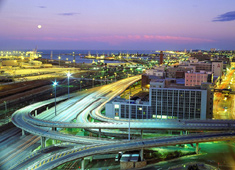SA cashes in on sound policies
22 February 2007
An expanding tax base, a growing economy and a decade of sound fiscal policies have given the South African government the "fiscal space" to massively increase spending on services and infrastructure.
Government spending has risen by over 9.2% a year over the past few years, and will be raised a further 7.7% a year over the next three years "as government ensures that effective programmes and promising new initiatives are funded in line with government's capacity to implement them," says Finance Minister Trevor Manuel.
Delivering his 2007/08 Budget speech in Cape Town on Wednesday, Manuel said that government revenue would come in at R475.8-billion this year - R29.5-billion more than forecast last February, and R9.4-billion more than estimated in October.
First post-1994 budget surplus
"The revised estimate for spending in 2006/07 is R470.6-billion, R3.6-billion less than the adjusted budget," Manuel told
Parliament. "As a result, contrary to our initial expectations, the budget balance for 2006/07 indicates a surplus of R5-billion."
The government thus posted a budget surplus of 0.3% in 2006/07, with a surplus of 0.6% projected for 2007/08.
Tax revenues were likely to continue to grow more strongly than spending for at least another year, the minister said, and state debt service costs as a percentage of GDP were thus projected to fall from 3% in 2006/07 to 2.1% in 2009/10.
"The savings on interest that we have seen since 2001 provides an additional R33-billion a year to spend on services and infrastructure, money that we would not have had if we kept on borrowing at the level it was in 1994."
Economic growth
Manuel attributed South Africa's increased revenue to the country's expanding tax base and growing economy. SA experienced a gross domestic product (GDP) growth rate of 4.9% in 2006, with growth now projected to average
about 5% a year over the next three years.
Due to slightly weaker growth in the world economy and the SA's recent interest rate hikes, the economy is expected to see slighter slower growth in 2007, of 4.8%, but growth is projected to rise to 5.1% in 2008 and 5.4% in 2009.
State spending is expected to rise over this period. "We are budgeting to spend R534-billion in 2007/08, rising to R650-billion in 2009/10," Manuel said.
Despite this increase, South Africa's budget surplus is only expected to return to a deficit in 2008/09, with a moderate budget deficit of 0.1% of GDP forecast, rising to 0.4% in 2009/10.
In defence of the surplus
Manuel was unfazed by South Africa's first budget surplus in decades, saying a number of factors had contributed to it.
These included consistent efficiency of tax collection, more taxpayers as a result of a broadening tax base - about 500 000 jobs had been created each year for the past three years – and a 7% increase in household consumption in 2006.
Furthermore, the government was acting on its pledge to take out "fiscal drag," Manuel said. "Much of our economic and fiscal policy has been aimed at increasing fiscal space and reducing our vulnerability to financial instability."
Government spending had also been restricted by capacity constraints in the private as well as the public sector, Manuel said, noting that the shortage of key skills vital to infrastructure expansion programmes - such as a civil engineers with project management experience - was a worldwide phenomenon.
Spending to do with development was being addressed, he said, adding that all government departments were accommodated in the Budget, while the tax "give" to corporates and individual taxpayers was "generous".
Government spending
Government spending has risen by over 9.2% a year over the past few years, and will be raised a further 7.7% a year
over the next three years "as government ensures that effective programmes and promising new initiatives are funded in line with government's capacity to implement them."
The 2007/08 Budget allocates R105.5-billion to education, R62.7-billion to health, R89.4-billion to social security and welfare, and R45.3-billion to housing and other social services.
R57.9-billion has been budgeted for police, prisons and courts, while R30.3-billion has been set aside for defence and intelligence expenditure.
Economic services - which would include measures to promote industrial development, black economic empowerment and small business development - gets R109.8-billion, while R40.1-billion goes to general administration expenditure by government.
This brings the total main Budget revenue for 2007/08 to R544.6-billion, to be divided among the three spheres of government.
National departments will receive 50.4% of available resources, while 42.4% has been allocated to the nine provinces and 7.2% to South Africa's 283 municipalities. This gives provincial and local governments almost half of South Africa's national financial resources for the financial year.
SouthAfrica.info reporter and BuaNews
|














